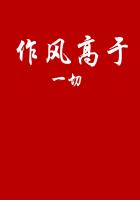POWER
His tongue was framed to music, And his hand was armed with skill, His face was the mould of beauty, And his heart the throne of will.
_Power_
There is not yet any inventory of a man's faculties, any more than a bible of his opinions. Who shall set a limit to the influence of a human being? There are men, who, by their sympathetic attractions, carry nations with them, and lead the activity of the human race. And if there be such a tie, that, wherever the mind of man goes, nature will accompany him, perhaps there are men whose magnetisms are of that force to draw material and elemental powers, and, where they appear, immense instrumentalities organize around them. Life is a search after power; and this is an element with which the world is so saturated, -- there is no chink or crevice in which it is not lodged, -- that no honest seeking goes unrewarded. Aman should prize events and possessions as the ore in which this fine mineral is found; and he can well afford to let events and possessions, and the breath of the body go, if their value has been added to him in the shape of power. If he have secured the elixir, he can spare the wide gardens from which it was distilled. Acultivated man, wise to know and bold to perform, is the end to which nature works, and the education of the will is the flowering and result of all this geology and astronomy.
All successful men have agreed in one thing, -- they were _causationists_. They believed that things went not by luck, but by law; that there was not a weak or a cracked link in the chain that joins the first and last of things. A belief in causality, or strict connection between every trifle and the principle of being, and, in consequence, belief in compensation, or, that nothing is got for nothing, -- characterizes all valuable minds, and must control every effort that is made by an industrious one. The most valiant men are the best believers in the tension of the laws. "All the great captains," said Bonaparte, "have performed vast achievements by conforming with the rules of the art, -- by adjusting efforts to obstacles."The key to the age may be this, or that, or the other, as the young orators describe; -- the key to all ages is -- Imbecility;imbecility in the vast majority of men, at all times, and, even in heroes, in all but certain eminent moments; victims of gravity, custom, and fear. This gives force to the strong, -- that the multitude have no habit of self-reliance or original action.
We must reckon success a constitutional trait. Courage, -- the old physicians taught, (and their meaning holds, if their physiology is a little mythical,) -- courage, or the degree of life, is as the degree of circulation of the blood in the arteries. "During passion, anger, fury, trials of strength, wrestling, fighting, a large amount of blood is collected in the arteries, the maintenance of bodily strength requiring it, and but little is sent into the veins. This condition is constant with intrepid persons." Where the arteries hold their blood, is courage and adventure possible. Where they pour it unrestrained into the veins, the spirit is low and feeble. For performance of great mark, it needs extraordinary health. If Eric is in robust health, and has slept well, and is at the top of his condition, and thirty years old, at his departure from Greenland, he will steer west, and his ships will reach Newfoundland. But take out Eric, and put in a stronger and bolder man, -- Biorn, or Thorfin, --and the ships will, with just as much ease, sail six hundred, one thousand, fifteen hundred miles further, and reach Labrador and New England. There is no chance in results. With adults, as with children, one class enter cordially into the game, and whirl with the whirling world; the others have cold hands, and remain bystanders; or are only dragged in by the humor and vivacity of those who can carry a dead weight. The first wealth is health. Sickness is poor-spirited, and cannot serve any one: it must husband its resources to live. But health or fulness answers its own ends, and has to spare, runs over, and inundates the neighborhoods and creeks of other men's necessities.
All power is of one kind, a sharing of the nature of the world.
The mind that is parallel with the laws of nature will be in the current of events, and strong with their strength. One man is made of the same stuff of which events are made; is in sympathy with the course of things; can predict it. Whatever befalls, befalls him first; so that he is equal to whatever shall happen. A man who knows men, can talk well on politics, trade, law, war, religion. For, everywhere, men are led in the same manners.
The advantage of a strong pulse is not to be supplied by any labor, art, or concert. It is like the climate, which easily rears a crop, which no glass, or irrigation, or tillage, or manures, can elsewhere rival. It is like the opportunity of a city like New York, or Constantinople, which needs no diplomacy to force capital or genius or labor to it. They come of themselves, as the waters flow to it. So a broad, healthy, massive understanding seems to lie on the shore of unseen rivers, of unseen oceans, which are covered with barks, that, night and day, are drifted to this point. That is poured into its lap, which other men lie plotting for. It is in everybody's secret; anticipates everybody's discovery; and if it do not command every fact of the genius and the scholar, it is because it is large and sluggish, and does not think them worth the exertion which you do.















